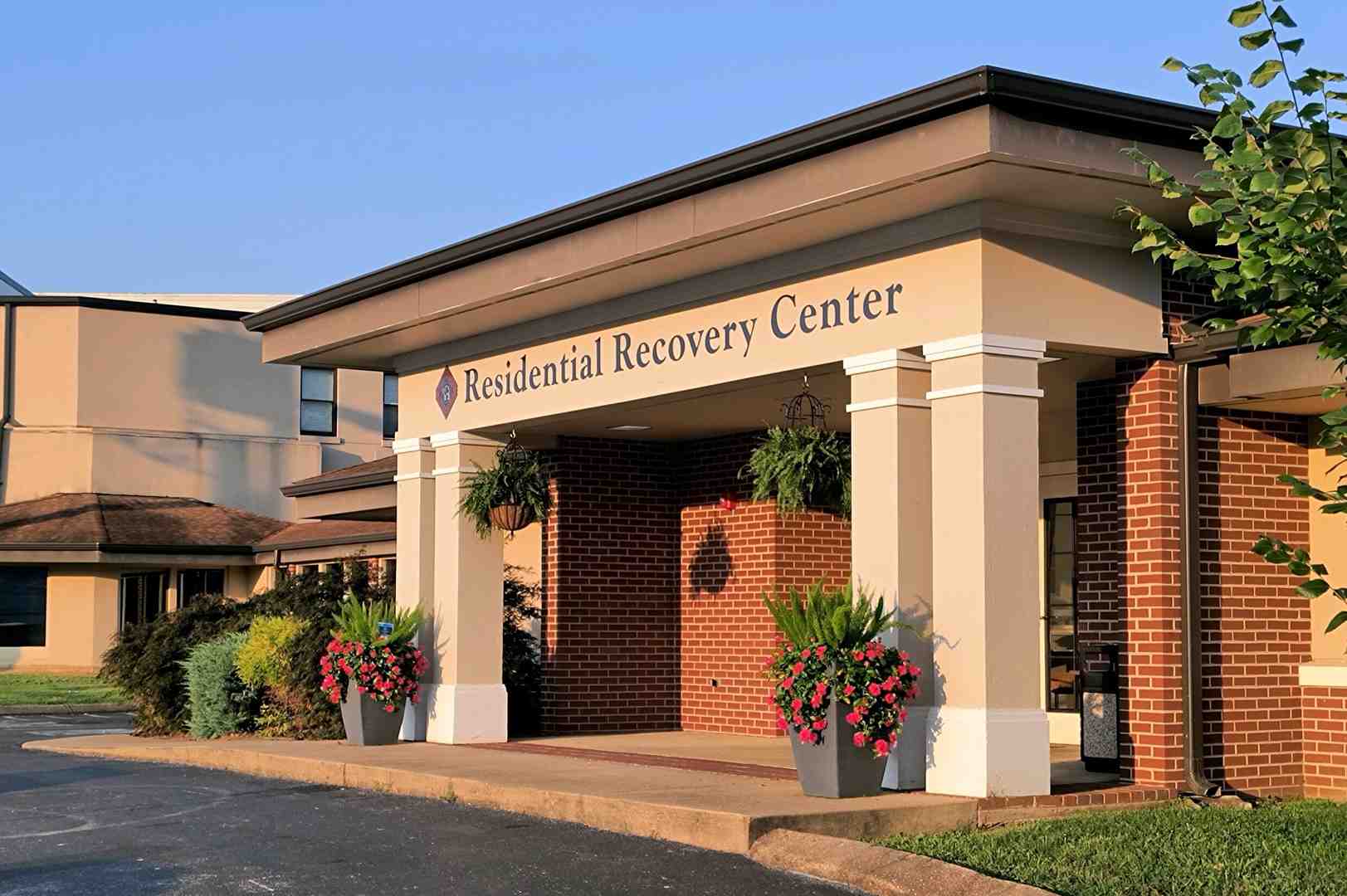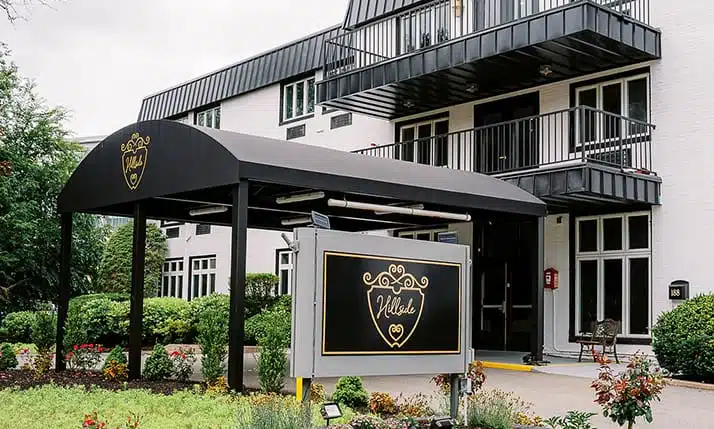
Finding Your Path to Recovery: Rehab Near Me
Searching for rehab near me often means you or a loved one needs immediate help. While the journey to recovery can feel overwhelming, finding the right support is the most important first step. Help is available.
Here’s a quick guide to what to look for:
- Types of Rehabs: Options include detox, inpatient (residential), and outpatient programs.
- Choosing the Right Fit: Consider individual needs, location, cost, and specific therapies offered.
- Key Factors: Look for accredited facilities, qualified staff, and evidence-based treatments.
- Next Steps: Reach out to a helpline or treatment center for a confidential assessment.
You don’t have to face addiction alone. This guide will help you make an informed decision.
Addiction Helpline America is here to guide you. Our experienced team provides compassionate support, connecting individuals with the right “rehab near me” resources nationwide.
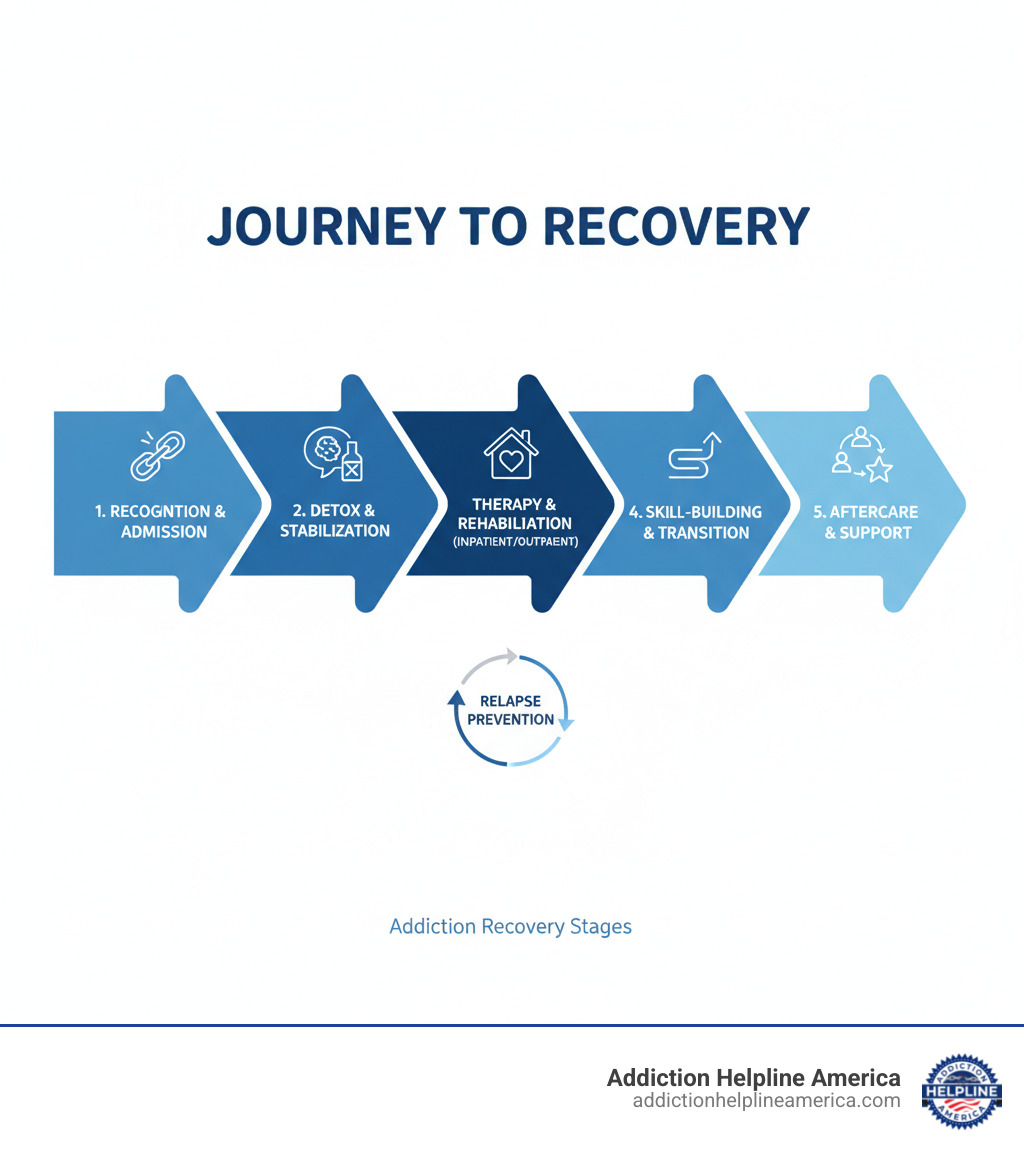
Rehab near me vocab explained:
Step 1: Identifying the Need for Treatment
Realizing something has to change is often the hardest and bravest part of the recovery journey. Recognizing addiction isn’t about blame; it’s about honesty and is the essential first step toward finding a rehab near me.
Addiction affects your body, behavior, and mind. Understanding these signs helps you know when it’s time to reach out for professional treatment.
Call Now – Your Journey to Recovery Begins Today!

Take the first step towards a healthier life! Call now to connect with our compassionate team and start your recovery journey today. Your path to healing awaits!
Our recovery specialists are available 24/7 to provide support, and all calls are confidential and free. Reach out anytime – we’re here to help!
Recognizing the Signs in Yourself or a Loved One
The signs of addiction often creep in slowly. Here are some common indicators:
When substances take priority over work, school, or family, responsibilities start falling through the cracks. This is a major red flag.
Tolerance builds as you need more of the substance to achieve the same effect.
Withdrawal symptoms like tremors, nausea, or anxiety appear when the substance wears off. This signals dependence, and people often keep using just to avoid them.
Despite wanting to stop, attempts to quit fail. This loss of control is a clear sign that addiction has taken root.
Substance use continues despite mounting consequences like job loss, legal trouble, or broken relationships. This is because addiction has a powerful grip that’s hard to break without help.
Relationship problems arise as arguments become more frequent. You might isolate yourself or shift your social circle to others who use, leaving loved ones feeling distant and worried.
These are symptoms of a condition needing professional care. If this sounds familiar, it may be time to explore options for a rehab near me.
Understanding Co-Occurring Disorders
Addiction often co-occurs with mental health conditions. About 50% of people with substance use disorders also have a mental health condition, known as a dual diagnosis. This creates a cycle where each condition feeds the other.

For example, someone with anxiety may use alcohol to calm their nerves, while a person with depression might use drugs to escape hopelessness. Those with PTSD may try to numb traumatic memories, and individuals with bipolar disorder might use substances to manage mood swings.
Treating only the addiction or the mental health issue is ineffective, as the untreated condition can trigger a relapse. Integrated treatment, which tackles both simultaneously, is crucial.
When searching for a rehab near me, finding a facility specializing in dual diagnosis is key. These programs offer coordinated care to heal both your mind and your relationship with substances.
If you want to dig deeper into how mental health and addiction intersect, you can explore research topics on substance abuse for more detailed insights.
Recognizing the need for treatment is a hopeful first step toward reclaiming your life, and you don’t have to take it alone.
Step 2: Exploring Types of Rehab Programs
When searching for a rehab near me, you’ll find many options. Treatment isn’t “one-size-fits-all,” so understanding the different levels of care is key to finding the right path to recovery. Let’s explore the main program types.
Medically-Supervised Detox
For many, recovery begins with medically-supervised detoxification, or “detox.” This provides a safe space for your body to clear itself of substances. Stopping drug or alcohol use can cause withdrawal symptoms, which range from uncomfortable to dangerous.
During detox, medical professionals monitor you to ensure safety and comfort, sometimes using medication to ease symptoms. While not a cure, detox is a vital first step that prepares you for therapy. Addiction Helpline America can help you find emergency detox services or an alcohol detox program.
Inpatient and Residential Treatment
Inpatient and residential programs offer an immersive, 24/7 structured care environment. Living at the facility removes you from daily triggers and distractions that fuel substance use.
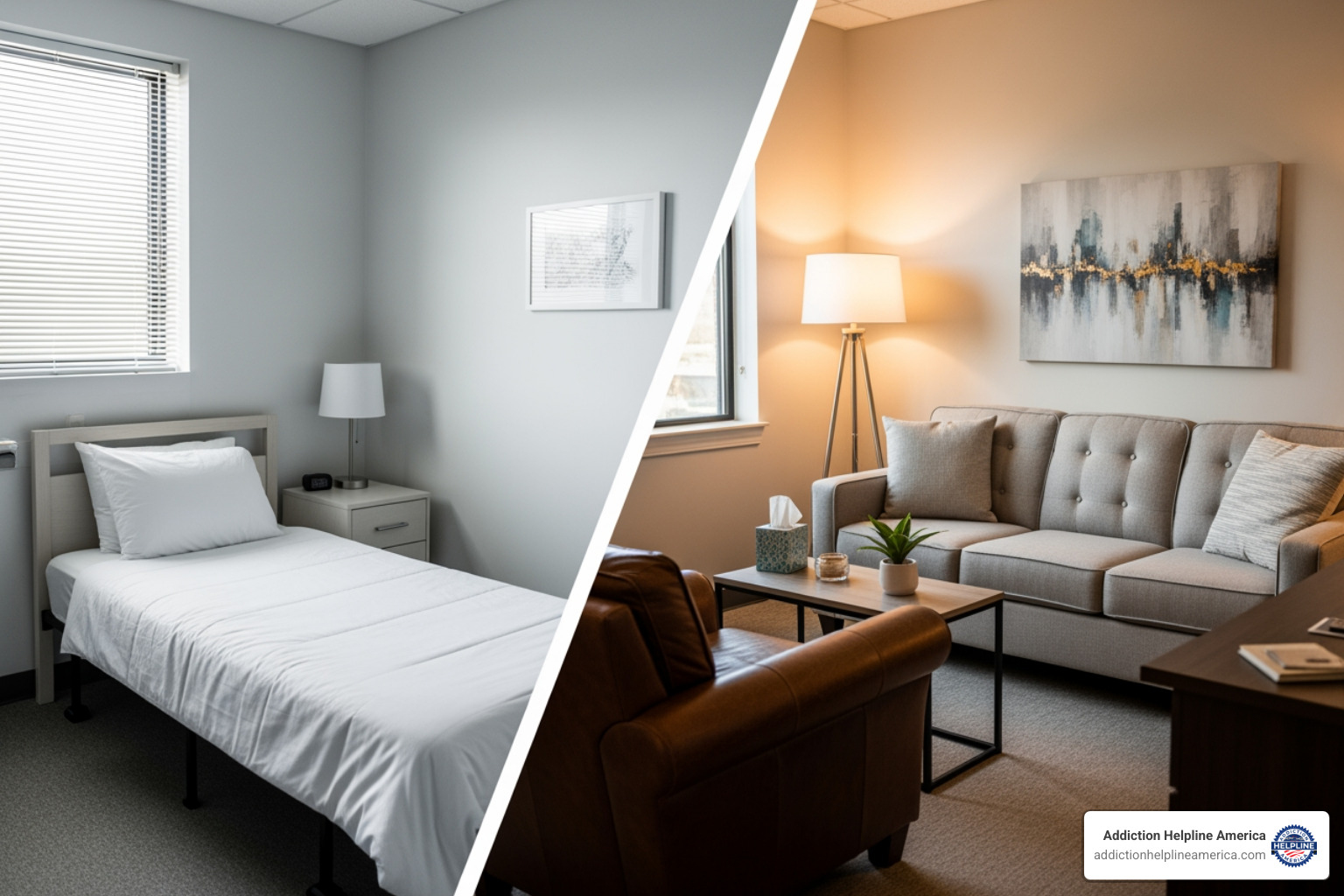
In this setting, you’ll receive constant support from staff and build coping skills through a structured routine of therapy and workshops. Living with peers fosters a sense of community. These programs are ideal for severe addictions or co-occurring mental health challenges. We can help you find excellent inpatient rehabs nationwide, including specific options like an inpatient rehab Costa Mesa guide for those in that area.
Outpatient Treatment Options
If a residential stay isn’t the right fit, outpatient treatment offers flexibility. You live at home while attending regular therapy sessions, making it a great option for those with strong support systems or who need to continue work or school.
Outpatient care varies in intensity. Standard Outpatient Programs involve a few hours of therapy weekly. Intensive Outpatient Programs (IOPs) offer more frequent and longer sessions, as seen in our intensive outpatient Costa Mesa guide. Partial Hospitalization Programs (PHPs) bridge the gap between inpatient and outpatient care, offering daytime treatment 5-7 days a week.
All outpatient programs focus on counseling, relapse prevention, and developing coping skills. They are a great choice for transitioning from inpatient care or when a residential program isn’t feasible. We can help you find outpatient rehabs that fit your life and support your recovery.
Call Now – Your Journey to Recovery Begins Today!

Take the first step towards a healthier life! Call now to connect with our compassionate team and start your recovery journey today. Your path to healing awaits!
Our recovery specialists are available 24/7 to provide support, and all calls are confidential and free. Reach out anytime – we’re here to help!
Step 3: How to Choose the Best Rehab Near Me
Choosing the right rehab near me is a critical, personal decision. Many factors come into play, from clinical approach to environment. We’re here to help you understand the therapies, activities, and admission process.
Key areas to consider include location (close to home vs. away from triggers), accreditation (a sign of quality care), staff credentials, the types of therapies offered, and the cost and insurance coverage. These points will guide you to the best fit.
Key Factors to Consider When Choosing a Facility
When evaluating a rehab near me, look at the specifics that impact care quality and long-term recovery.
A facility’s accreditation and licensing are strong quality indicators. Accreditation ensures high standards for care and safety, while state licensing confirms legal operation.
The treatment team’s expertise is paramount. Look for centers with highly credentialed staff, including doctors, therapists, and addiction specialists experienced with substance use and co-occurring disorders.
Effective treatment uses evidence-based practices proven by research, such as Cognitive Behavioral Therapy (CBT), Dialectical Behavior Therapy (DBT), and Medication-Assisted Treatment (MAT).
The location and environment impact recovery. Some prefer a serene setting, while others benefit from an urban one. Consider if staying close to home for support or traveling to escape triggers is better for you.
Ask if the facility offers specialized programs for specific populations, such as gender-specific or LGBTQ+ affirming care (see our LGBTQ alcohol rehab complete guide). Programs for veterans, young adults, or those with dual diagnoses ensure customized treatment. Directories like the 2024 National Directory of Drug and Alcohol Use Treatment Facilities can help.

Common Therapies and Activities
A comprehensive rehab near me offers a range of therapies and activities to address the physical, mental, and emotional aspects of addiction:
- Cognitive Behavioral Therapy (CBT) helps change negative thought patterns linked to substance use.
- Dialectical Behavior Therapy (DBT) focuses on emotional regulation and distress tolerance, which is helpful for co-occurring conditions.
- Individual counseling offers one-on-one sessions to develop personalized coping strategies.
- Group therapy provides a supportive peer environment to share experiences.
- Family therapy helps heal relationships and improve communication.
- Holistic approaches like yoga, meditation, and art therapy support overall well-being.
- Fitness and recreational activities improve physical health and boost mood.
What is the admission process for a rehab near me?
The admission process can seem daunting, but Addiction Helpline America is here to simplify it with free, confidential, and personalized guidance.
Here’s a general overview:
- Initial Phone Call: The process starts with a confidential call to an admissions specialist to discuss your situation and determine if the facility is a good fit.
- Confidential Assessment: Next, an in-depth assessment (phone or in-person) helps the team understand your history and needs to create a personalized treatment plan.
- Insurance Verification: We can help with insurance verification to clarify coverage and financial expectations.
- Travel and Packing: If traveling for treatment, transportation will be arranged. The facility will provide a list of what to pack.
- Intake Process: Upon arrival, the intake process includes paperwork, meeting the team, and getting oriented to the facility for a smooth transition.
Before calling a rehab near me, gather information like medical history, specific needs (LGBTQ+, veteran), insurance details, and substance use history. This will streamline the process.
Step 4: Understanding the Logistics of Treatment
It’s natural to have questions about the logistics of treatment. Understanding how much rehab costs, if insurance covers it, and how long it lasts can empower you to make the best decisions when seeking a rehab near me.
How Much Does Rehab Cost?
The cost of private addiction treatment varies widely. Costs can range from around $3,000 per month for essential treatment to $80,000 or more per month for luxury programs with extra amenities.
Several factors influence the price:
- Level of care: Inpatient programs are typically more expensive than outpatient as they include accommodation, meals, and 24/7 supervision.
- Program duration: Longer programs cost more.
- Location: Facilities in more expensive areas may charge more.
- Amenities: Private rooms, gourmet meals, and spa services increase the cost.
- Staff-to-client ratio: A lower ratio often means a higher price.
While the cost may seem high, addiction itself is far more costly to your health, relationships, and finances. Investing in recovery is an investment in your future. If private treatment is out of reach, we can help you explore free addiction recovery programs.
Using Insurance and Other Payment Options
Many health insurance plans cover a significant portion of addiction treatment costs. Thanks to laws like the Affordable Care Act (ACA), mental health and addiction services are often considered essential health benefits.
The first step is verifying your benefits. Our team can contact your insurance provider to understand your plan’s coverage, including deductibles and co-pays.
In-network facilities have a contract with your insurer, usually resulting in lower costs. Out-of-network facilities may still be partially covered. We can help you find addiction treatment facilities that take insurance that work with your plan.
Government-funded programs like Medicare and Medicaid can also cover treatment costs for those who qualify. Coverage varies by state, so it’s important to check your eligibility.
If insurance is limited, don’t lose hope. Many facilities offer payment plans or financing options. Financial worries shouldn’t be a barrier to getting help.
What is the typical duration of a rehab near me?
The right length for rehab is personal and depends on many unique factors.
- 30-day programs are a common starting point, offering an intensive introduction to recovery.
- 60-day programs allow more time for therapeutic work and skill development.
- 90-day programs are often recommended for severe addiction or co-occurring disorders, as research suggests longer treatment leads to better outcomes. Programs can extend beyond 90 days based on individual needs.
The length of stay is determined by:
- Severity of addiction
- Substance type
- Co-occurring disorders
- Response to treatment
- Support system
We’re here to help you explore long-term rehab programs and find the perfect fit, ensuring the duration of your stay supports your personal path to lasting recovery.
Step 5: Planning for Life After Rehab
Completing a rehab near me program is a huge victory, but it’s the start of a new path, not the finish line. Recovery is a lifelong journey that requires ongoing attention and support.
It’s important to know that relapse is not failure; it’s a common part of recovery. A slip is a signal to adjust your plan, not give up. This is why strong aftercare and relapse prevention strategies, planned before you leave treatment, are crucial for moving forward.
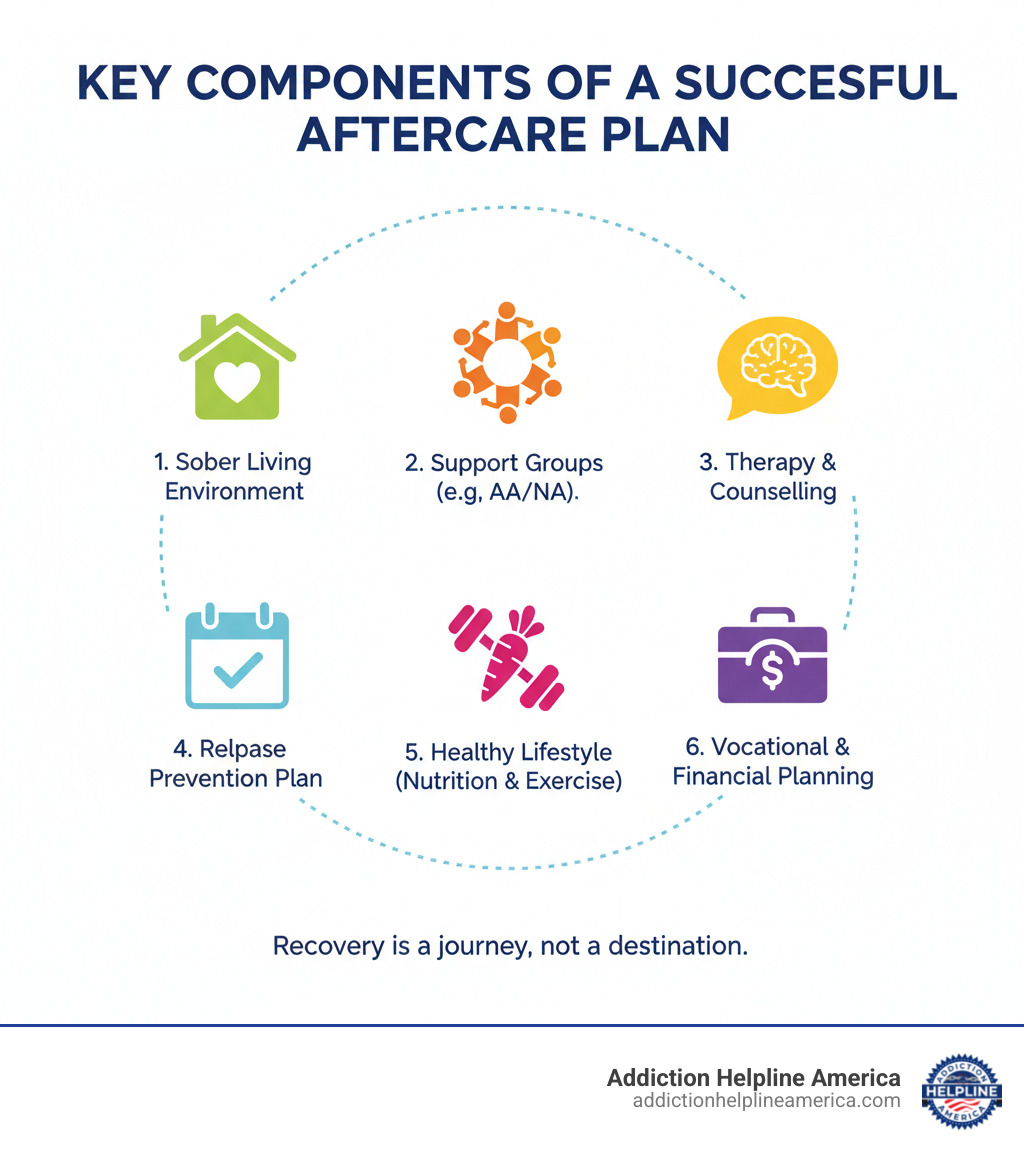
Relapse Prevention Strategies
A relapse prevention plan is a personal toolkit of strategies you begin building in treatment. It evolves as you go and helps you handle cravings and stress.
- Identifying triggers is the first step. Triggers are the people, places, or feelings that make you want to use. In treatment, you’ll work with a therapist to pinpoint your triggers and create a plan to manage them.
- Developing coping skills involves learning healthy ways to manage stress and cravings without substances. This can include mindfulness, exercise, or calling a friend. Our staying sober tips page offers more practical advice.
- Creating a daily routine is a powerful tool. Structure reduces boredom and the risk of relapse. A routine with regular sleep, meals, exercise, and support meetings helps you move forward.
- An emergency contact plan is essential. This is a list of people to call during a crisis, such as a sponsor, friend, therapist, or a helpline. Keep it accessible so you never have to face a tough moment alone.
Since relapse is common, proactive aftercare and relapse prevention planning are crucial for long-term recovery. Learn more about treatment effectiveness on our page about addiction treatment success rates.
Call Now – Your Journey to Recovery Begins Today!

Take the first step towards a healthier life! Call now to connect with our compassionate team and start your recovery journey today. Your path to healing awaits!
Our recovery specialists are available 24/7 to provide support, and all calls are confidential and free. Reach out anytime – we’re here to help!
Aftercare and Ongoing Support
Leaving the structured environment of a rehab near me can be jarring. Aftercare—the support you receive after treatment—is not optional; it’s the scaffolding that supports you as you rebuild your life.
- Sober living homes bridge the gap between treatment and independence. They provide a structured, substance-free environment with peer support.
- Alumni programs keep former clients connected through check-ins, events, and mentorship. Staying connected to the recovery community reduces isolation.
- Support groups like AA and NA are lifelines for many. These peer-led groups offer a non-judgmental space to share experiences and receive encouragement. Learn more about the philosophy on our 12 Step Promises page.
- Continued individual therapy is vital for working through underlying issues and reinforcing coping skills.
- Stepped-down care options like IOPs or PHPs can be the right next step after residential treatment, providing a middle ground between intensive care and full independence.
The journey to recovery is continuous. Having a strong support network and ongoing resources is vital for sustained sobriety. At Addiction Helpline America, we’re committed to connecting you with these essential aftercare services.
Your Path to Recovery Starts Today
Finding the right rehab near me can feel overwhelming, but by reading this guide, you’ve already taken a huge step. We’ve covered the signs that treatment is needed, the types of programs available, how to choose a facility, and the logistics of treatment and aftercare.
Recovery is an ongoing journey that takes courage. At Addiction Helpline America, we believe a sober future is possible for everyone. We offer free, confidential, and personalized guidance, connecting you with the best treatment centers in our nationwide network.
Taking the first step is the hardest but most powerful one. You don’t have to do it alone. Reach out to us today. Your path to recovery can begin now.
Explore different types of treatment programs to find your fit
Our helpline is 100%
free & confidential
If you or someone you care about is struggling with drug or alcohol addiction, we can help you explore your recovery options. Don’t face this challenge alone—seek support from us.
Programs
Resources
Will my insurance
cover addiction
treatment?
We're ready to help
Find the best
drug or alcohol treatment
center
Are you or a loved one struggling with addiction? Call today to speak to a treatment expert.





